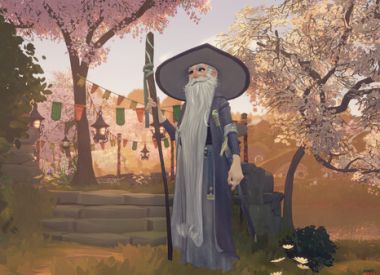Joel Potrykus’ 2015 movie Buzzard starred a young man who made his own Freddie Krueger claws and spent a significant and delightful portion of his adventure force-feeding a nerd Cheetos on a treadmill belt. Marty was alienated and angry, so put upon and apart from society that he could only lash out, often slashing himself in the process. Still, Marty also dealt with a job, rent, shopkeepers, bullies, debt and check cashers. He was alien in his surroundings but still attached to society, with reactions that sprouted from his own frustrations and internal conflicts.
The Alchemist Cookbook takes that alienation a step further, setting Sean (Ty Hickson) alone in a rundown trailer in the middle of the woods. His only ongoing knowledge of civilization comes from Cortez (Amari Cheatom), a talkative bullshitter who brings out groceries and cat food for Kaspar (prompting The Alchemist Cookbook’s Cheeto moment, as Cortez chokes down canned cat tuna).
If anyone at #SXSW has seen Joel Potrykus' THE ALCHEMIST'S COOKBOOK, I'm itching to hear about its "EVIL DEAD by way of Jim Jarmusch" vibes.
— Matt Barone (@MBarone) March 14, 2016
The Alchemist Cookbook is so unmoored that it’s not even clear what Sean is doing out in the forlorn trailer for a significant portion of the movie’s runtime. He spends his days cutting batteries in half, running chemistry experiments and saving the results in his freezer, filtering water and playing with logs. It all has the comforting regularity of habit, which eventually decays into the compulsiveness of ritual.
It’s only late in the movie, well after Sean has switched from chemistry to demonology, that his goal’s become clear: he’s searching for wealth independent of society. In one of the movie’s most moving scenes, Sean describes his naive fantasies of the rich life. “I was going to order a truckful of Doritos, eat Doritos sandwiches every day,” Sean says, before outlining his plans for the Little Debbie room.
Joel Potrykus' THE ALCHEMIST'S COOKBOOK is the the type of movie I come to #SXSW for. I could leave Austin very happy right now (but won't).
— David Lowery (@davidlowery) March 14, 2016
Here then is when The Alchemist Cookbook ties itself back to the same desperation that made Buzzard such a lit fuse. For Sean, poor and black and mentally ill, success in society was so remote that exiling himself to the woods and working on alchemy seemed more viable. His desperation has smoldered for so long that the devil began to seem like a potential ally.
Since The Alchemist Cookbook is taking much of the same youthful anger and societal alienation of Buzzard and piling supernatural horrors on top, it can take some investment and faith. With Sean’s mental state degrading over the course of the movie, viewers are often left without much tethering them to the experience. Hickson’s performance as Sean helps out quite a bit here, injecting real pathos into a rock throwing ceremony that may not make any sense to us, but is essential to the narrative he’s experiencing just outside of our grasp (“I’ll give him my fucking teeth, I don’t care!”).
That The Alchemist Cookbook is both a deeply personal journey and a horror film may leave both arthouse goers and gorehounds feeling shorted. When The Alchemist Cookbook goes genre, it really commits, with one of the best and most chilling possession dramas playing out in front of a forlorn campfire. But for the most part the supernatural threat is no more than a scary shape in the woods. This is no monster movie. Meanwhile, Sean’s personal journey becomes increasingly over-the-top, as he transforms his body and demeanor in front of us, then struggles to claw back his humanity from the demon’s grasp. The Alchemist Cookbook exists in a no-man's-land between hell and Earth. The journey isn't for everyone, but The Alchemist Cookbook will find its reverent congregants.
The Alchemist Cookbook is fascinating, but loses specificity by placing itself in the nebulous realm of demons and black magic. Demons have the power to awe because their evil is unformed and potentially all-consuming. Yet, Sean is someone viewers will want to encompass. This results in struggle, with the immediacy and palpable anger of Buzzard dulled under a layer of occult styling. Without a real world around Sean his loss of self feels groundless, the chaos of nature bouncing his own madness back and rarely drawing the audience into the shared secret.


















